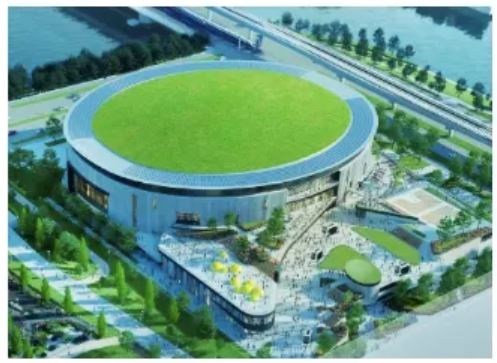Toyota Motor, Toyota Fudosan, and Toyota Alvark Tokyo announced the groundbreaking for the construction of the highly-anticipated Tokyo A-Arena in the Odaiba Aomi area. Toyota Fudosan hosted the ceremony to commemorate the start of this ambitious project. Expected to be completed in June 2025, the arena aims to begin operations in the fall of the same year.
Situated on the eastern side of the former Palette Town, a large-scale commercial facility that closed in August 2022, the location provides easy access from the Haneda Airport and Shinagawa Station. The arena is also within walking distance from the Tokyo Teleport Station on the Rinkai Line and Aomi Station on the Yurikamome Line.
Upon its completion, the multipurpose arena will be managed by Toyota Alvark Tokyo and will function as the home court for the Toyota Alvark Tokyo, a prominent team in the professional basketball B. League. The arena will cater to a variety of sports events and other activities.
Aligned with the project’s theme of “discovering potential together!”, the venue will be a hub where potentials are explored and realized, with a special focus on sports, mobility, and sustainability. The arena will forge partnerships with a wide range of entities to fulfill its mission.
Tomohide Yamamura, President of Toyota Fudosan, stressed during his speech, “We aim to create a venue that can accommodate a broad spectrum of potentials by working closely with Toyota and Toyota Alvark Tokyo. We will also strive to energize the Aomi, Odaiba community.”
The project’s key themes revolve around creating next-generation sports experiences, pioneering future mobility services, and designing sustainable lifestyles.
The new arena aims to invigorate the sporting scene by hosting a variety of indoor sports, urban sports, parasports, and e-sports. The project hopes to encourage people to engage more in sports and will leverage advanced technology to enhance spectator enjoyment.
Leveraging Toyota’s mobility technology, the arena aims to provide more enjoyable and convenient experiences for its visitors, aiming to create an unmatched arena experience.
With a keen emphasis on sustainability, the project focuses on reducing waste within the arena and contributing to the community through the creation of two on-site parks. Currently, the arena is the first in Japan under review for LEED certification, denoting Leadership in Energy and Environmental Design. The certification process is handled by the U.S. Green Building Council and is an essential component of the arena’s vision for a sustainable lifestyle that emphasizes recycling and reuse.
